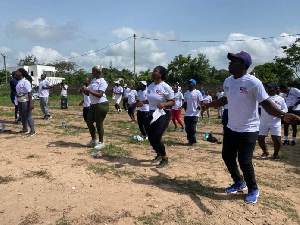Agriculture: As Ghanaians Go To The Polls
SOME GENERAL OBSERVATIONS
Agriculture plays a vital role in development because it feeds populations and industries, and generates foreign exchange earnings as well. Cocoa, for instance, has been a major source of revenue for national development since its nationalization under the progressive government of Nkrumah. Yet, it appears the discovery of commercial quantities of oil and gas is gradually contributing to a diversion of policy attention and strategic investment from agriculture. We may be lucky to have hearkened to US-based Nigerian scientist Philip Emeagwali’s advice to Nigerian leaders, to diversify the national economy and not to rely exclusively or overwhelmingly on petro-dollars alone for underwriting the country’s development economics and political economy.
This prophetic indictment of Nigeria’s political economy has bitten so deeply into the convenient conceit of Nigerian leadership, to the extent that drastic cuts in oil products on the international market are being felt in the Nigerian economy and the living standard and quality of life of the Nigerian people. Ghana is no different. What is more, policy modalities such as the Economic Partnership Agreement (EPA) and Genetically Modified Organisms (GMOs) threaten the status primacy of agriculture in strategic priorities of national development. Corporatizing food production and distribution is what GMOs is centrally about, hence a need for food sovereignty. It is unfortunate, even sad, to see Ghana importing basic vegetables such as tomatoes from Burkina Faso.
What happened to the enviable status of Ghana as the world’s largest producer of cocoa? Scientific agriculture (agronomy) and industrial agriculture, large-scale mechanized farming, good road networks and arteries, large-scale storage facilities, investment from government (subsidies) and the private sector, understanding of agricultural meteorology (agro-meteorology), and ready markets are some of the policy variables required to breathe new life into agriculture, a declining sector of the Ghanaian economy.
Much has been made of the fact that our trained agricultural graduates and specialists prefer the service industry, for instance, to agriculture. This is not untrue. This perception could result from the fact that agriculture is generally not seen as a “noble” profession from the point of view of the educated elite, or of ordinary educated citizens. Rather, it is generally seen as a “dirty” preoccupation by some in the educated class, with others viewing it with some level of intellectual disgust and skepticism. It could also be that financial returns from agriculture are not so great, even reliable, in this sector.
Whatever the reasons are, agriculture is a force to reckon with. No economy can survive it. A people capable of self-sufficiency in agriculture have no need for others to feed them. It makes dependency complex somewhat immaterial in a potential validation of the socioeconomic and political enterprise of famine. Such a people have enough room to pursue technological, industrial, and scientific development and advancement. America is a good example, with a tiny minority of the population feeding the entire population and parts of the world. Alas, agricultural beggary constitutes one of the primary causations of Africa’s entrenched dependency complex and development conundrums.
Yet, we have large “untapped” and fallow acreages of land whose generosity can feed Ghanaians and her budding industries and generate excess supplies (glut) for the international market. Nevertheless, the virtual absence of supply chain management in Ghana’s political economy makes for an underperforming sector represented by agriculture. Unreliable energy supply, power shedding, or power outages do not even make refrigeration technologies in our proposed storage facilities an attractive policy suggestion.
Regardless, in the hypothetical scenario that these facilities are available government can buy excess agricultural products for use in the school-feeding program, psychiatric institutions, etc. This is important because agriculture as a whole does not stand alone as is generally considered to be the case. It is an institutional octopus with its supple arms set in almost every facet of Ghanaian national life. It is the virtual soul of any national enterprise, of national psychology.
The national enterprise and national psychology of any body politic are inclusive of the dynamic politics of the collective agency of stomach psychology. They are inseparable, so to speak. This is why we worry when we realize that the fast rise of the service industry as an important foreign exchange earner for Ghana threatens to push agriculture further to the backwater of policy misprioritization and intellectual backwardness characterizing Ghana’s Fourth Republic. Yet the services industry can play a major role in revamping the agricultural sector by way of providing loan facilities to farmers, investing in agriculture, advertisements, insurance, legal counseling, marketing advice, and what have you.
AGRICULTURE AND THE SERVICE INDUSTRY
More fundamentally, procurement, information technology, operations management, and logistics are essential areas the service industry can cover, for agriculture has become a highly technological and scientific venture, with the service industry concentrating on agribusiness. This is why Ghana needs educated farmers, scientists, and specialists in the agricultural sector, with emphasis on agricultural epigenetics. But agriculture should not be limited to plant biology or botany. Knowledge of plant biology or botany has been extremely important in the development of plant-based pharmacology and herbal medicine, of pharmacopoeia, though the modern science of medicine is fast moving away from plant-based pharmacology and pharmacognosy to synthetic pharmacology and pharmacogenetics.
Agriculturists have also played a major role in the cultivation of artemisinin which is used for treating and managing malaria, as well as of opium poppy whose opiate derivatives have immense implications for pain management and oncology. Herbal medicine is still an important area of clinical research.
ANIMAL HUSBANDRY
For a long time guinea pigs have provided the avenue for such research. Botany and zoology work hand in hand. Animal husbandry, animal science, theriogenology, wildlife farming, and animal breeding are essential micro-sectors of the agriculture. It is heartening to be in the know that Ghana is doing somewhat well in the area of animal husbandry, with grass-cutter farming eventually becoming a lucrative industry. It is a foreign exchange earner.
PUBLIC HEALTH CONCERNS AND DISEASE BURDEN
The recent Ebola virus epidemic shows how important it is for our scientists to develop protocols for clinical epidemiology and virology. We need to come up with advanced technologies to identify potential vectors and natural reservoirs (nidus (es)/nidi) of emerging diseases and infectious agents. Thus, it is not overstating the case for acquisition of scientific literacy, even if such knowledge is passable, to be tied to knowledge of agricultural practices and, in turn, to knowledge of microbiology.
Take note of the following vectors and reservoirs: Armadillo/Rabbit/Mice (Leprosy; Mycobacterium Leprae), Snails (Schistosomiasis), Field Mice (Lassa Fever), Birds (Avian Influenza), Pigs (Cestode/Tapeworm Infections), Shellfish (Cholera; Vibrio Cholerae), Bats (Ebola Virus Disease/Rabies), Bushmeat (Ebola Virus), Monkey/Chimpanzee (Simian Immunodeficiency Virus), and so forth. Likewise, unwashed raw vegetables and fruits may contain dangerous bacteria like E. coli, much the same way raw or unpasteurized milk may contain dangerous bacteria. Thus public, personalized, and specialized knowledge of animal hygiene and microbiology is a must for the pursuit and effective functioning of public health diktats. Also knowledge of epidemiology, public health law, and etiology are essential to an understanding of animal hygiene, microbiology, and public health.
Finally, fishery or fish farming is another area calling for serious research. There is no denying the fact that, oil exploration in Ghana is driving away fishermen and potentially threatening the survival of the fish industry itself in the Western Region, including such environmentally-unfriendly acts as poisoning fish and other aquatic animals. Lead and mercury accumulation in tuna is another public health concern. We cannot ignore the larger field of aquafarming or aquaculture. Poultry farming and livestock production need equal attention in our agricultural economy. All in all, we cannot risk undermining the institutional efforts of public health by exclusivizing general knowledge of food-, water-, and vector-borne paradigms from strategic policy considerations as part of the everyday running of the political economy of the body politic.
FOOD FOR THOUGHT
First, adding value to our agricultural products is as important as seeding itself. In other words, the link between seeding and adding value to raw materials is the abode of a country’s real wealth and national genius. As a result, investment in food engineering is a necessary policy strategy for agricultural development and food security. A crucial component of food engineering is packaging engineering. This calls for large-scale refrigeration, storage facilities, materials management, and expertise in both inventory control analysis (systems) and food science. Legally mandated ingredient labeling and eliminating the underground economy of food fraud should be seen as distant corollaries of food engineering.
Food security, safety, and preservation as well as moving away from the outdated Guggisberg Economic Model (GEM) of dependency complex are the primary motivations for effective food-engineering strategies. After all, GEM makes economic sense insofar as the political praxis of export-oriented industrialization and comparative advantage. Still, we need both export and import markets for our agricultural products.
Second, we need to take soil science and crop/plant science serious. Investment if plant genomics, agricultural/plant biotechnology, and biological engineering are also important. Our scientists need to develop or acquire research techniques in these areas to increase the nutritional quality of edible foods as well as to produce disease resistance and drought tolerance plants. Let us point out that agricultural biotechnology (and agronomics) requires knowledge of mathematics, such as design of experiments, statistics (stochastic and deterministic models), analytics, and therefore we need to invest in the mathematical sciences.
Third, we need to address the production and technical shortcomings of horticulture. The focus should be on enhancing the nutritional quality of vegetables in our food chain. Horticulture should be taught and practiced in Ghanaian schools as part of the curricula of agricultural science and food science.
Fourth, Ghanaians need to make a holistic assessment of the viability of our theses on agriculture by taking into consideration food security versus food insecurity, rural development, poverty reduction, employment opportunities, and environmental sustainability.
Fifth, increasing crop yield or agricultural output across all sectors of Ghana’s agricultural economy should be a national priority. We need to build strategic reserves and to explore the benefits of agricultural nuclear technology. Importantly, Kwame Nkrumah’s Nov. 25, 1964 presentation, titled “Dr. Kwame Nkrumah’s Ghana Atomic Reactor Foundation Stone Speech” on the website of the Ghana Atomic Energy Commission (GAEC), captures the strategic policy adoption of nuclear technology for increasing crop and livestock production in Ghana’s agricultural economy. Pest management (Sterile Insect Technique, SIT) or pestology is a natural beneficiary of agricultural nuclear technology.
Sixth, quality control and quality assurance are required to monitor and maintain high standards in agricultural products. Monitoring and eliminating possibilities of heavy metals entering Ghana’s food-chains should be pursued at every level of the food-chains. Pollution via galamsey as well as via other mining activities should be closely monitored by the appropriate authorities. The Food & Drugs Authority (FDA), the Ministry of Health, the Environmental Protection Agency (EPA), and the Ghana Standards Authority (GSA) should be proactive in the exercise of their oversight responsibilities. Our food-chains run the risk of heavy-metal imbibition in the face of official and non-official dereliction. It requires the moral and social-political proactiveness of collective agency to effectively deal with the problems of pollution and pesticide waste and their far-reaching repercussions.
Seventh, we need to build more as well as maintain our farm-to-market road networks. This falls on the Ministry of Transport’s shoulders.
Eighth, we need to seriously look at population growth and urbanization and the aggregate stress they put on land economy and the political economy of agricultural. We need to take a hard look at agricultural diversification and the political economy of strategic reserve. A diversified economy and depolicization are key to national development.
Finally, the leaderships of the Savannah Accelerated Development Authority (SADA), the Youth Employment Agency (YEA), the Ministry of Food and Agriculture, the Ministry of Environment, Science, Technology and Innovation, the Ministry of Fisheries and Aquaculture Development, the Ministry of Energy and Petroleum, the Ministry of Employment and Labor Relations, the Ghana National Association of Farmers & Fishermen (GNAFF), parliamentary select committee for Food, Agriculture and Cocoa Affairs, and Food Sovereignty Ghana have a role to play in this assessment exercise. In the final analysis, we can make sense of these convoluted suggestions in the larger context of the Millennium Development Goals/Sustainable Development Goals of the United Nations.
These institutions should pivot strategic policy directions of food security on the concept of food sovereignty, rather than allowing foreign concerns to corporatize food production and distribution, a point already conceded.
CONCLUSION
This is why we need capable men and women with the necessary expertise to carry out serious environmental impact assessment (analysis) for the agricultural sector. We need capable men and women with expertise in climate impact analysis (climatology or atmospheric science) as well. Environmental and climate impact analysis should be tied to policy concerns of desertification, afforestation, afforestation, soil erosion, environmental engineering, and phytoremediation. We need to take care of anthropogenic emissions of greenhouse gases on the platform of environmental and climate impact analysis.
Our people should not go hungry for lack of strategic and tactical planning in the agricultural sector on the part of the political class. Have we forgotten the songs “We Are the World,” “Hear n Aid,” “Tears Are Not Enough”? and “Do They Know It’s Christmas?” so soon? One wonders if our corrupt politicians ever consumed plant and animal protein while growing up, an ingredient required for brain development, a lack of which can spell disaster for psychological malnutrition. Let us therefore develop the science and technology to enhance plant and animal protein for human consumption. Let us also encourage our people to patronize locally produced agricultural products. This calls for patriotism. But the political class must first provide leadership given their sophisticated taste for foreign products, expectations, and culture. In this regard Ghanaian agriculture has a long way to go, we reckon.
We shall return…
Opinions of Monday, 18 January 2016
Columnist: Kwarteng, Francis
As Ghanaians Go To The Polls 5
Entertainment













